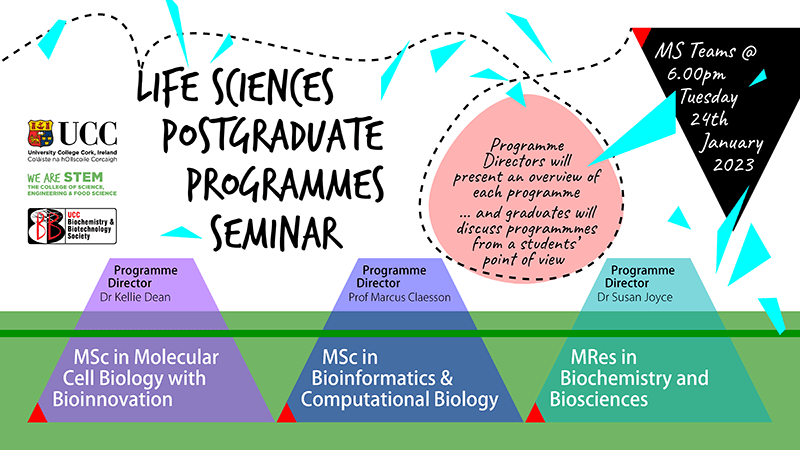Life Sciences Postgraduate Programmes seminar

Professor Marcus Claesson initiated the information evening session with the MSc in Bioinformatics and Computational Biology.
MSc in Bioinformatics and Computational Biology
This level 9 degree program is a merger of biology and computation, gives students a chance to gain experience in a different science discipline. This course welcomes students who have completed their undergraduate degree, ideally in science or computer science. Biotechnology, genetics, microbiology, biochemistry, biomedical sciences, and computer sciences are some of the undergraduate degree's from which students have come. Subjects in the course include microbiology, biochemistry, computer science and math's. Both theoretical and practical aspects are covered throughout the 12-month period. The skills gained during the course include bioinformatic theory and practice, genome analysis and system biology, computer programming, data analysis and mathematical models. Graduates have a variety of career options such as research, PhD opportunities, data analyst, biostatistician, programmer, or it can be a “back door” into an IT career. A research project is completed during the 1-year course which runs for 4 months May/June - October. This gives students the opportunity to work with renowned companies such as Janssen Biologics, Cara Partners, Roche and SeqBiome. The possibility of Erasmus is also catered for in this MSc program. Universities include; Gothenburg University in Sweden and University California San Diego, USA. If you have any questions regarding this MSc program, please contact Professor Marcus Claesson.
MRes in Biochemistry and Biosciences
Dr Susan Joyce shared information regarding the MRes in Biochemistry and Biosciences. The MRes is a one-year full-time or two year-part-time research master's starting in October each year, incorporating a research project and some taught modules. Dr Joyce emphasised the fact that you choose your research topic, and you choose your modules that interest you. The course is a fantastic opportunity for students to gain valuable laboratory skills and experience which will elevate their status when finding a career in that field. This course has 20 credits of research-related modules with a focus on presentation skills, research planning, critical thinking, communication skills and scientific writing. The major component of the program is a research-intensive project which spans 12 months. This research project allows students to engage with research experts and to study a biochemical topic in which they have major interest. The established research areas include cancer biology, neuroscience, immunobiology, host-microbe interactions and vaccine development, just to name a few. This course is affiliated to several world class centers of excellence such as: APC microbiome Ireland, Environmental Research institutes, Cork Cancer Research Centre, and Tyndall Research Centre.
Ms Emily Butler, a student currently completing an MRes in Biochemistry and Bioscience took time to recommend this program to students who are interested in the research field. She discussed how she selected her research project topic and how she was assigned a supervisor to carry out her research project. She also mentioned the modules that are offered to students completing the program.
Dr Joyce and Emily are happy to answer any questions students may have about this excellent master's program. You can find their contact details under the links above.
MSc in Molecular Cell Biology with Bioinnovation
To conclude the evening's session, Dr Kellie Dean from the school of Biochemistry and Cell Biology gave an insight into the MSc in Molecular Cell Biology with Bioinnovation. Dr Dean shared the many advantages of undertaking this level 9 degree. Some of these advantages include a higher earning potential, career advancement opportunities, develop specialist knowledge and personal development.
In 2019, MSc in Molecular Cell Biology with Bioinnovation was shortlisted for postgraduate course of the year! Without a doubt, it is a brilliant course. It runs full time for 12 months like the other 2 programs mentioned previously. It involves teaching discipline-specific modules, entrepreneurship and innovation training, lab development in laboratory techniques and scientific communication. A 6-month research project is required on this course. 3 research themes are available to choose from, they include; Cancer, infection/immunity, and neuroscience. This program has been a partnership with European Molecular Biology laboratory (EMBL) since 2012. Students with undergraduate degrees in Biochemistry, Biotechnology, CPC, Microbiology, Genetics, Neuroscience, Physiology, Chemistry, Biomedical science, and public health science (plus a few more) are welcomed into this program. 100% of students who graduated from the program are in employment or further education within one year of completion. These students involved in this course, work with charities such as the Irish Cancer Society and have raised over 7,000 euro for them since 2012! Which is amazing!
Mr Justin Hayes complemented Dr Kellie Dean's speech with his own experience as a recent graduate of this master's program. He explained how assessment works and how his research project went from April-August. Dr Kellie Dean can be contacted via email for any questions at the link above.
I would like to thank Dr Sinéad Kerins for organizing this highly informative seminar regarding opportunities after your undergraduate degree.
I would like to thank all speakers, Professor Marcus Claesson, Dr Susan Joyce, Dr Kellie Dean, Ms Emily Butler, and Mr Justin Hayes, who delivered excellent presentations and clear knowledge regarding the master's programs in UCC.
Molly Boyle
3rd year Biochemistry representative
Biochemistry and Biotechnology Society
